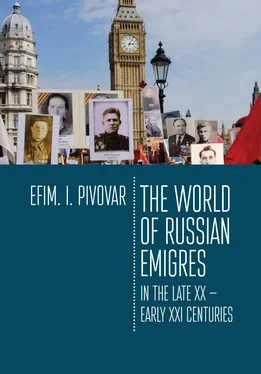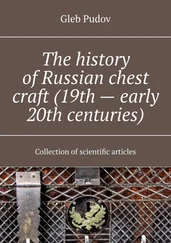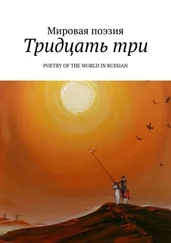Unlike the Russian emigres in the 19 thand, especially, the 20 thcentury, today’s Russian compatriots abroad are not cut off from their homeland and, if they so desire, maintain strong ties with the Russian Federation as a metropolitan state with the homeland as a mental and cultural space that also extends to people from post-Soviet countries. Russian compatriots are able to tap into the values of the Russian culture in its entirety, including the legacy of the Russian community abroad of the past century both thanks to the opportunities of a global civilization with its international travel and information technologies and support for Russian language and culture offered by Russia across the world. At the same time, an increasing number of Russian-speaking compatriots want to receive higher education, work in high-tech areas, study in depth the language and culture of their host countries thus increasing their flexibility while maintaining their ties to the Russian culture as an identity element. It is highly likely that the subsequent transformation of the Russian world will take place along with further improvement of its qualitative characteristics.
The active representatives of the modern Russia abroad have maintained their focus on intellectual and spiritual values, which is demonstrated by the activities of the World Congress of Russian Compatriots Living Abroad and numerous public organizations established within Russian-speaking communities in different countries across the world and by various cultural initiatives implemented on a global scale, from the Days of Russian Culture (a traditional holiday of Russian emigration from the mid-1920s) to the Russky Mir Professor program. Institutions of the Russian world abroad accumulate considerable intellectual resources based on the synthesis of Russian cultural values and latest information, social concepts, and technologies that enrich both Russian and world culture.
Since in the 21 stcentury the role of supranational factors in the international arena is gradually growing, communities and organizations of the Russian world are becoming part of an informal but increasingly influential representation of Russia in the global socio-political and information space. The institutional structures of Russian compatriots act as an integral part of the modern global society, in particular, forming the global civilizational and intellectual space, introducing basic Russian cultural values into the international information field and expanding the global presence of the Russian language as the basic cultural code of the Russian world. Speaking at the VI Assembly of the Russian World on November 3, 2012, Russian Prime Minister Dmitry Medvedev noted that “the diaspora uniting millions of compatriots gives Russia a competitive advantage and enormous potential,” emphasizing the importance of expanding the presence of the Russian language in the world in the context of globalization. “The Russian world shall become a global space if the amount of information in the Russian language is not inferior in quantity and quality to the amount of information in other languages. It is very difficult, but feasible.” [6] Speech by Russian Prime Minister Dmitry Medvedev at the VI Assembly of the Russian World in Moscow (2012, November 3). The official website of the Russian Government. Retrieved from http://government.ru/news/6346/
In the future, structures of the Russian world can be united in a system of network associations operating under the conditions of on-going globalization in a global complex of organizations existing in the intellectual and information space. The Russian-speaking Academic Science Association has already taken certain steps in this direction, creating a website Dialogue with Russian-speaking scientists working abroad in order to expand intellectual cooperation between Russia and the Russian world by promoting dialogue between the Russian scientific community and Russian-speaking scientists abroad. [7] Dialogue with Russian-speaking scientists working abroad. Retrieved from http://dialog.extech.ru/index.php?mlevel=1
At the beginning of the 21 stcentury, Russian diasporas in the near and far abroad as promoters of Russian culture have assumed a new, but no less important mission, i. e. to engage in a dialogue between Russia and the international community on the most pressing issues of international politics and economics. People belonging to the Russian world mostly support the fundamental values of our time: pluralism of political and civilization systems; recognition of their legitimacy, importance and stability; unwillingness to incite “color revolutions,” or to use global financial, economic, rating and information tools for exerting pressure on others’ foreign policy, etc.
The ongoing changes in the balance of power on the planet, i. e. the economic and political strengthening of the BRICS countries, have also significantly influenced Russian diasporas’ status: the governments and peoples of China, Brazil, and South Africa see the Russian-speaking community as an ally in the modernization of the country and society. [8] Sadovnichiy, V., Yakovleva, Y., Akaeva, A. (Eds.) (2014). Prospects and Strategic Priorities for the Rise of the BRICS. (Scientific report for the VII BRICS Summit).
At the same time, in the Baltic States, Poland, and Ukraine, Russian compatriots are portrayed negatively as an opposition force, provoking a corresponding attitude towards them manifesting in prohibition of historical and cultural events, hostile media coverage, etc. (For instance, Poland did not allow a group of Russian motorcyclists called “Night Wolves” to travel through its territory as part of “Victory Day” campaign; Great Patriotic War of 1941–1945 memorials are being pulled down in Poland and the Baltic States; centers of Russian-language education and culture have been practically banned in Ukraine).
At the same time, Russian compatriots in developing countries (Brazil, China, South Africa, etc.) as a creative factor of a new society have made a significant contribution to the modernization of the economy, development of innovation technologies and humanitarian knowledge.
Representatives of the Russian world greatly contribute to the Eurasian integration: the Russian-speaking community acts as a moderator of centripetal processes in the CIS. The foundation of the Customs Union, as well as the Shanghai Cooperation Organization (SCO), the EAEC and the EAEU, were warmly supported by the Russian diasporas; it has significantly influenced the attitude of the governments of the countries of residence by pushing them towards closer and more constructive integration with Russia, in terms of creating a common Eurasian social, economic, and political space. [9] Pivovar, E. (2016) Eurasian Integration Project in the Former Soviet Union: Prerequisites, Formation, Development. Aleteya.
Representatives of the Russian world consistently advocate development of mutual understanding between cultures, intellectual dialogue in the global political and economic space. At the same time, modern institutions of the Russian world are becoming more and more independent subjects of the international law, along with bodies of recipient states and world legal supranational structures, such as the UN, the OSCE, etc. The International Council of Russian Compatriots (ICRC), International Association of Youth Organizations of Russian Compatriots (IAYORS), the European Russian Alliance, etc. are examples of such institutions.
Therefore, in the 21 stcentury, the Russian world has become a sustainable organizational, historical, cultural, and mental system which ensures its stable existence in the context of globalization and a shaping multipolar world. Modern geopolitical space defines objective reasons for future successful development of the Russian world in the 21 stcentury: the creation of a multicultural civilization provides great opportunities for preserving national identities within the global intellectual and information space. At the same time, Russia that historically has been a multi-ethnic and multi-confessional country represents a model of a complex and global civilization allowing interaction and synthesis of cultures without losing their identity. In the 21 stcentury, the comprehensive national consciousness of representatives of the Russian world implies a continued self-identification with the national culture and historical time of the Russian civilization: Russian-speaking communities in various countries of the world seek to encourage Russian compatriots to maintain the sense of belonging to the social and spiritual culture of their historical homeland, Russia.
Читать дальше












